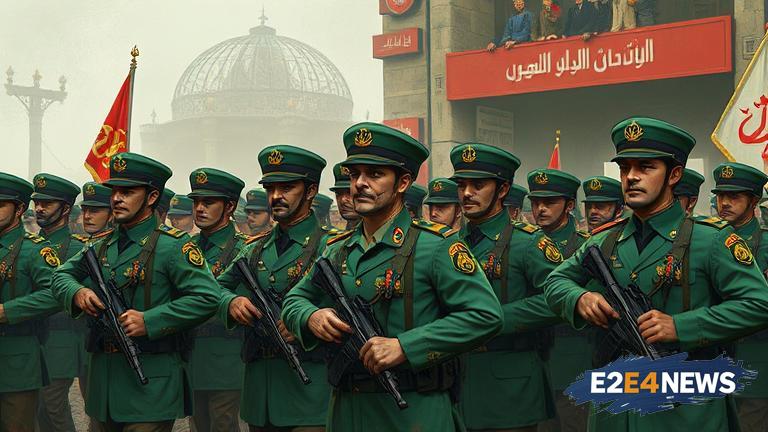The Islamic Revolutionary Guard Corps (IRGC) is a highly influential and complex military organization in Iran, established in 1979 after the Islamic Revolution. The IRGC is tasked with protecting the country’s Islamic system and preventing foreign interference. With a estimated 125,000 active personnel, the IRGC is a significant player in Iran’s military and political landscape. The organization is divided into several branches, including the Ground Forces, Aerospace Forces, Naval Forces, and Quds Force. The Quds Force is responsible for extraterritorial operations and has been involved in various conflicts in the Middle East. The IRGC has been designated as a terrorist organization by several countries, including the United States, due to its alleged involvement in terrorist activities. Despite this, the IRGC remains a powerful and respected institution in Iran, with many Iranians viewing it as a symbol of national pride and resistance against foreign aggression. The IRGC has also been involved in various economic and social activities, including construction, agriculture, and healthcare. The organization has a significant presence in Iran’s economy, with estimates suggesting that it controls up to 20% of the country’s GDP. The IRGC has also been involved in various human rights abuses, including the suppression of dissent and the persecution of minority groups. The organization’s leadership is closely tied to the Iranian government, with the Supreme Leader of Iran serving as the commander-in-chief of the IRGC. The IRGC has also been involved in various regional conflicts, including the Syrian Civil War and the Iraq War. The organization’s military capabilities are significant, with access to advanced weaponry and technology. The IRGC has also been involved in various cyber warfare activities, including hacking and espionage. Despite its significant influence and capabilities, the IRGC faces various challenges, including economic sanctions and international pressure. The organization’s future is uncertain, with some predicting that it will continue to play a dominant role in Iranian politics and others predicting that it will face significant challenges and potential reform. The IRGC’s impact on regional and global politics is significant, with the organization playing a key role in shaping Iran’s foreign policy and military strategy. The IRGC’s relationship with other countries is complex, with some viewing it as a terrorist organization and others viewing it as a legitimate military force. The organization’s activities have significant implications for global security and stability, with the potential for conflict and instability in the region. The IRGC’s history is closely tied to the Iranian Revolution, with the organization emerging as a key player in the aftermath of the revolution. The IRGC’s structure and organization are complex, with various branches and subsidiaries. The organization’s leadership is highly influential, with many of its leaders holding significant positions in the Iranian government. The IRGC’s activities are closely monitored by international observers, with many viewing the organization as a key player in regional and global politics.
